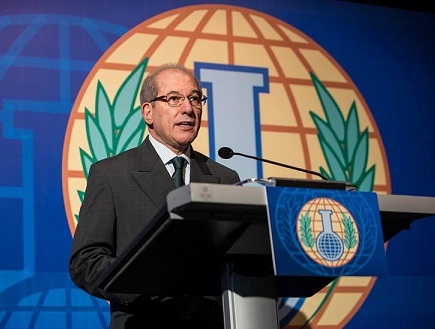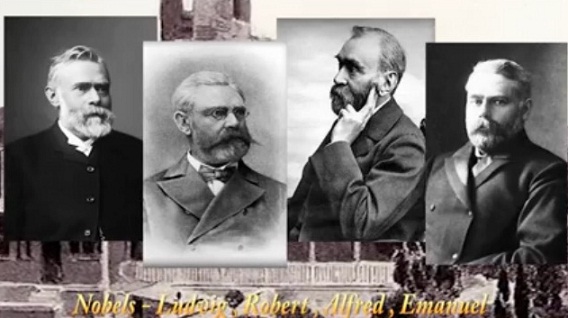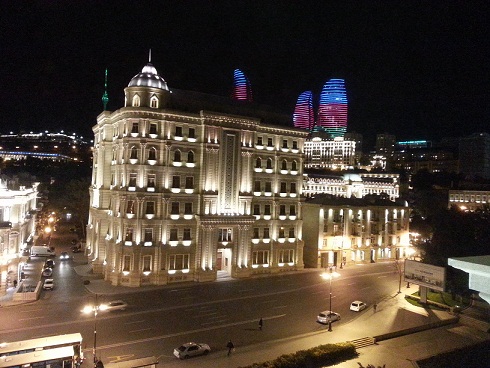
OPCW Director-Gneral Ahmet Uzumcu in a presscon oct 9 in The Hague on their winning the Nobel Prize.
His name is Franz Ontal, head of the inspector training of the United Nations-backed chemical weapons international watchdog, which oversaw the destruction of Syria’s chemical weapons.
Ontal is from Negros Occidental. An article in the Philippine Daily Inquirer said studied in La Salle Bacolod where he completed his undergraduate course in biology. He immigrated to the United States in the 1980s and worked in New York where he held jobs related to medical services. In 2005, he joined the OPWC in The Hague. Netherlands first as a medic for the chemical weapons inspector and disposal teams. He now holds the position of head of inspector training.
“Recent events in Syria, where chemical weapons have again been put to use have underlined the need to enhance the efforts to do away with such weapons, the Norwegian jury that selected the winner said in its tribute to the group.
The OPCW received 8 million kroner ($1.2m) prize, much of it came from the family Nobel’s investment in Azerbaijan, an oil and gas rich country in the Caucasus region.
We had the privilege of visiting Azerbaijan last week to observe their October 9 elections, which saw the re-election of President Ilham Aliyev and there’s an obvious sense of pride among Azerbaijanis in their country’s important role in the Nobel Prize.
A feature online article in the Azerbaijan-based businessyear.com on Gustaf Nobel, chairman of the Nobel Sustainability Trust relates that “In the middle of the 1850s Ludvig Nobel, elder brother to the world famous inventor and creator of the Nobel Prize, Alfred Nobel, established a mechanical factory in St Petersburg producing grenades with a new technology. He later followed this with cannons, rifles, and gun carriages. The company was soon to become one of the largest suppliers to the Russian army and the beginning of a tremendous success story, which would be largely unknown to most people outside Russia and Azerbaijan. Working together with Ludvig was his older brother Robert. He was sent to the Caucasus region on a mission to find walnut wood for rifle stocks to fill an order of 200,000 rifles for the Russian army.
“ Arriving in Baku, he discovered that oil was literally bubbling out of the ground, and he realized that there was a great opportunity in the oil business. He returned to St Petersburg and managed to convince Ludvig to invest in Baku. In 1875, the first Nobel refinery was inaugurated under the name Bra Nobel. Alfred was also called upon to invest in the company, which he did. They could never have realized at the time that by 1917 Bra Nobel would be the second largest oil company in the world. “
A study titled “The Nobel Prize and connection between Sweden, Russia and Azerbaijan” by Vefa Kurban of the Dr.Dokuz Eylul University in Turkey, gave another interesting aspect of the Nobels and how what made them establish the prize that works for world peace and the betterment of the lot of mankind.
Kurban said: “The Nobels were the first foreign oil industrialists in Baku. Immanuel Nobel was the leader of that Swedish family. Immanuel was born on March 24, 1801 in Hevel, Sweden. He studied architecture. Immanuel, the founder of Stockholm Institute of Technology, invented submarine mines when he was still in Sweden. Later, when his invention was noticed by the Russian Armed Forces, he went to Russia in 1837 upon the invitation of the Russian government.”
More from Kurban’s study: “Immanuel had four sons named Emil, Ludwig, Robert and Alfred Nobel. Emil, the youngest one, died at the age of 28 while experimenting with nitroglycerine in his father’s factory in Heleneborg, Sweden. Four more workers were killed in the same explosion.“Alfred was an engineer and inventor. Robert was the first one in the family who pointed out the trade opportunity in Baku. Ludwig was one of the major actors in the Russian oil industry.”
Kurban said “the Nobels paid attention to safe use of nitroglycerine, discovered by Sobrero in 1945. After the death of his brother Emil in a nitroglycerine experiment, Alfred devoted himself to the invention of a new explosive. He started working to produce that explosive with his father and brothers in Krummel around Hamburg. After three years of working non-stop, he named his invention dynamite.”
“The family name became associated with their inventions, smokeless powder and dynamite, all over the world,” Kurban said.
More from Kurban: “The entire explosive manufacturing in the world was under Alfred Nobel’s supervision. However, Alfred’s inventions did not serve only for the purpose of peace. Dynamite, which caused holocausts, made Alfred regret and feel deep sadness for his invention. He died in Italy on December 10, 1896.
“A year before his death he signed his last will and testament in Paris. His will specified that his fortune be used to establish international awards in physics, medicine, chemistry, literature and peace. First prizes were awarded in Oslo, Norway and in Stockholm Sweden as Alfred wished. Alfred Nobel allocated 30 million crowns for the creation of the reward system. A 5.200.000 crown of that money was the income gained from Baku oil. “
It can be said that the world is better because of the genius and generosity of the Nobels and Azerbaijan oil.
Related video on the Nobels in Baku:

